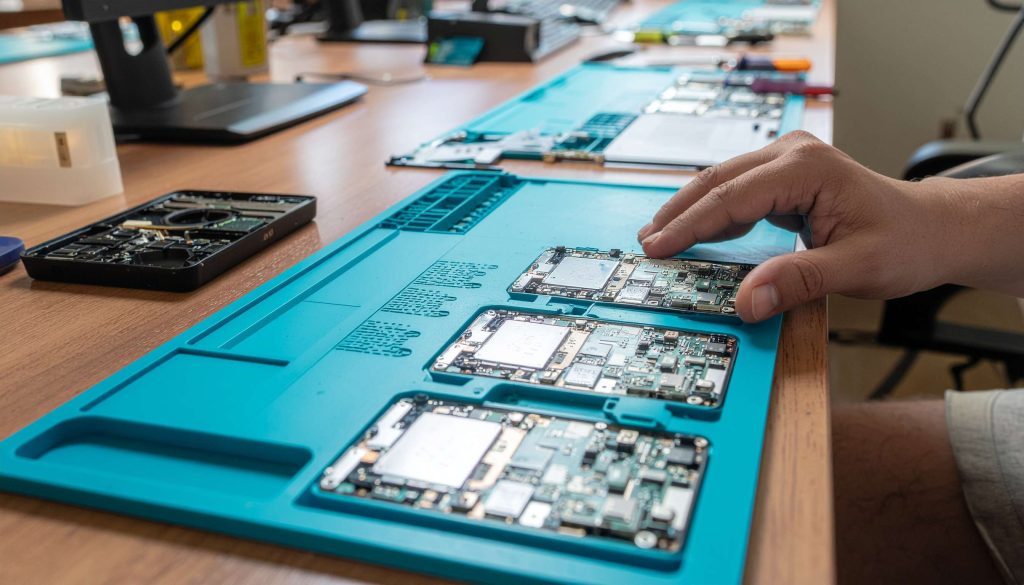For product-based startups, launching can feel like walking a tightrope. There is too much inventory too soon, and you’re buried in unsold units. Too little preparation, and you miss your moment.
That’s where small batch production for startups becomes the strategic middle ground. It allows founders to build real products, test them with real users, and make smart decisions—without blowing their entire budget upfront.
This guide breaks down how small batch production reduces risk, accelerates feedback loops, and gives startup founders the breathing room they need to build something great.
What Is Small Batch Production for Startups?
Small batch production is the process of manufacturing physical products in low quantities—usually between 20 and 500 units—to test and validate before scaling.
For startups, it’s a powerful way to launch without the financial burden of large MOQs (minimum order quantities). The goal isn’t just to make a product—it’s to make one that customers actually want.
This approach aligns perfectly with lean startup principles: build, test, learn, iterate.

Why Startups Shouldn’t Jump Into Mass Production
Many new founders think mass production is the goal from day one. It’s not.
Producing 1,000+ units before testing can tie up capital, create storage headaches, and lock you into early mistakes. If your product isn’t market-ready, you’ve just wasted a huge investment. Small batch production allows for validation and iteration before scaling.
Benefit #1: Lower Financial Risk
Startups thrive on agility and smart capital management. Cost-effective small batch manufacturing allows you to keep cash flow flexible. Instead of putting $20,000 into tooling and 1,000 units, you can spend a fraction to create 20–100 testable units.
That means:
- Less pressure to sell out fast
- Less risk of ending up with unsold stock
- Freedom to pivot if needed
This is especially critical if you’re self-funded, crowdfunding, or bootstrapping.
Benefit #2: Faster Feedback from Real Customers
You can’t fix what you don’t test. Small batch production lets you ship a working version of your product to real users in weeks—not months. Their feedback becomes your roadmap for improvements.
You get to:
- Identify flaws before scaling
- Gather testimonials and early reviews
- Validate product-market fit in real conditions
That’s infinitely more useful than perfecting a prototype in isolation.

Benefit #3: Iterate Without Starting Over
Unlike mass production, which locks you into tooling and production setups, small batch workflows are more flexible. You can make changes to your product—materials, sizing, features—between runs without losing massive investments. Every batch becomes a learning opportunity, not a liability.
Founders who iterate fast often win because they outlearn competitors.
Benefit #4: Test Demand on Real Channels
Platforms like Amazon, Kickstarter, and Shopify are ideal proving grounds for early products. But they don’t require 1,000 units to start. With small batch production for startups, you can test how your product performs on real marketplaces before investing heavily.
A 50-unit launch:
- Creates urgency and exclusivity
- Reduces fulfillment overhead
- Reveals sales trends in real time
This is especially helpful for DTC (direct-to-consumer) brands or niche products.
Benefit #5: Streamlined Supply Chain and Logistics
Small batch production simplifies everything from storage to shipping. You won’t need a warehouse or third-party logistics team just to manage your first batch. With as few as 20–100 units, most startups can handle fulfillment in-house or with a lightweight 3PL partner.
Smaller batches also mean:
- Easier quality control
- Lower shipping and storage costs
- Reduced product loss or damage risk
Real-World Scenario: From Prototype to Kickstarter in Weeks
Imagine this: a solo founder designs a smart pet accessory. Instead of waiting six months for mass production, they:
- Build a prototype in as early as 7 days with PrototyperLab
- Launch a 50-unit run to send to testers and influencers
- Collect real feedback and marketing content
- Use early traction to launch a successful Kickstarter
That’s the kind of speed and learning curve small batch production enables.

How Cost-Effective Small Batch Manufacturing Works at PrototyperLab
At PrototyperLab, startup founders can get:
- A working prototype in as early as 7 days
- Small batch production starting at just 20 units
- Transparent pricing at $25/hour for engineering
Because production is handled in Vietnam with US-based project management, founders get the cost savings of offshore manufacturing with the safety and clarity of domestic oversight. That means faster turnaround, better communication, and scalable quality.
When to Transition to Larger Batches
Once your product is refined and you’ve proven there’s consistent demand, scaling up makes sense. Mass production can lower your per-unit cost and support retail expansion or wholesale channels. But only after you’ve:
- Finalized your product design
- Collected strong customer feedback
- Developed a repeatable sales strategy
Use data, not guesswork, to decide when it’s time to scale.
Start Smart, Stay Agile
Small batch production gives startups exactly what they need—speed, control, and learning. It lets you launch without overextending. It helps you listen to your customers before betting big. And it turns risk into opportunity at every step.
For founders building hardware, consumer tech, or niche lifestyle products, small batch is more than a stepping stone—it’s a strategy.
Get your product off the ground with small batch production that works for startups. PrototyperLab offers cost-effective small batch manufacturing, 7-day prototyping, and US-based legal protection with Vietnam-based production.

